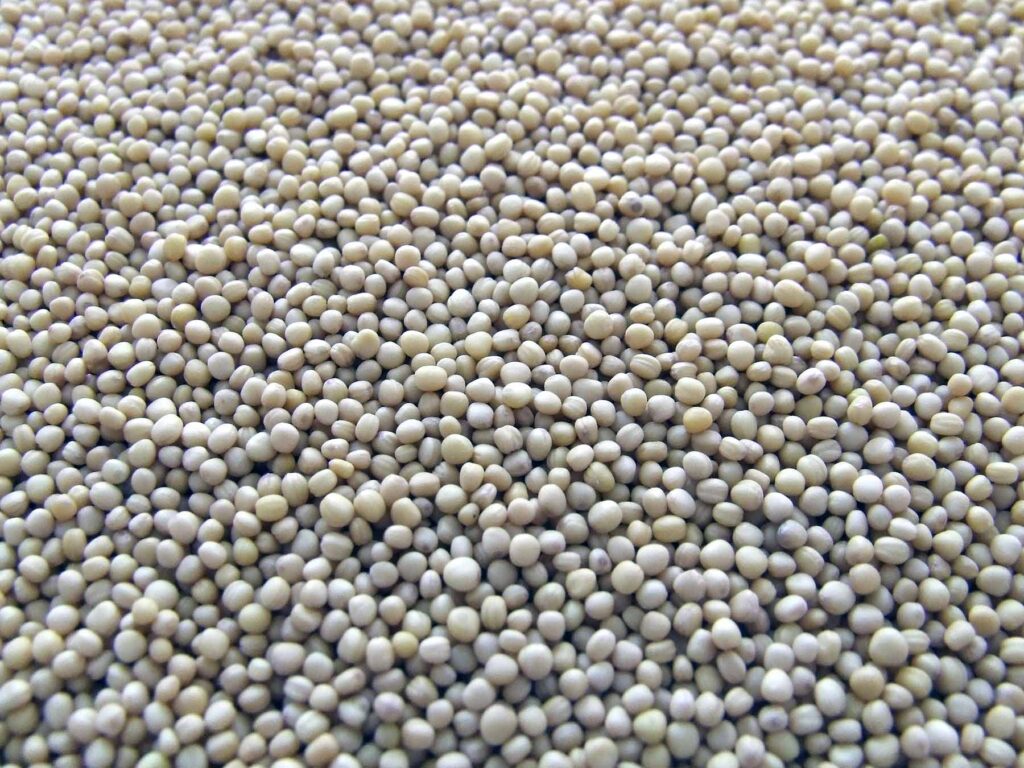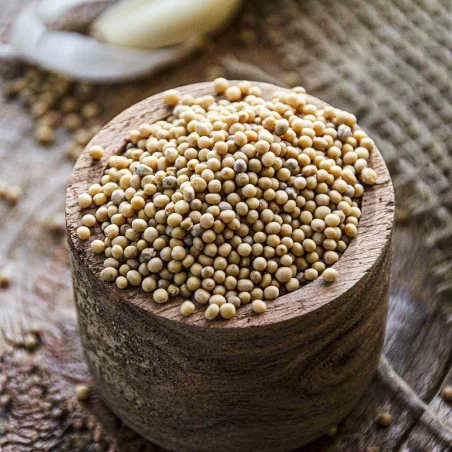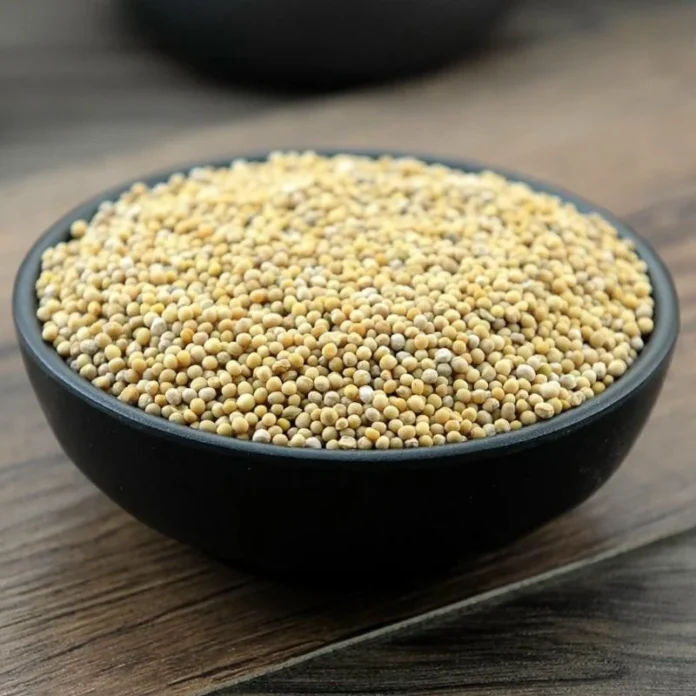INTRODUCTION:
White mustard seeds, scientifically known as Sinapis alba, are small, round seeds derived from the white or yellow mustard plant, a member of the Brassicaceae (cruciferous) family. Native to the Mediterranean region, white mustard is now cultivated widely across Europe, North America, and parts of Asia.These seeds are pale yellow or light tan in color and are slightly larger and milder in flavor compared to their brown or black mustard counterparts.

English: White Mustard Seeds
Hindi: सफ़ेद सरसों (Safed Sarson)
Urdu: سفید رائی (Safeed Rai)
Sanskrit: श्वेत सरषप (Shweta Sarṣapa)
Arabic: الخردل الأبيض (Al-Khardal Al-Abyad)
Bengali: সাদা সরিষা (Shada Sorisha)
Punjabi: ਚਿੱਟੀ ਸਰੋਂ (Chitti Saron)
Tamil: வெள்ளை கடுகு (Vellai Kadugu)
Telugu: తెలుపు ఆవాలు (Telupu Aavalu)
Gujarati: સફેદ રાઈ (Safed Rai)
Marathi: पांढरी मोहरी (Pandhri Mohari)
HEALTH BENEFITS:

Vitamins and minerals:
They are a good source of manganese, selenium, magnesium, calcium, iron, and phosphorus, along with vitamins C and K, thiamin, riboflavin, and folate.
Antioxidants:
The seeds contain powerful antioxidants like glucosinolates, isothiocyanates, and phenolic compounds. These fight free radicals that can cause cellular damage and chronic diseases.
Omega-3 fatty acids:
Mustard seeds contain healthy fats, such as alpha-linolenic acid (ALA), which can help reduce inflammation and lower the risk of heart disease.
Aids digestion:
Historically and in traditional medicine, white mustard seeds have been used to stimulate appetite and aid in the digestion of heavy foods. Their fiber content helps regulate bowel movements and prevent constipation.
Relieves discomfort:
The seeds are believed to stimulate the secretion of digestive juices, which may help alleviate indigestion, bloating, and gas.
Anti-inflammatory effects
Combats chronic inflammation:
The glucosinolates in mustard seeds have strong anti-inflammatory properties, which may help reduce pain and swelling associated with conditions like arthritis.
Soothes muscle pain:
Applied topically in traditional mustard plasters or baths, the seeds provide a warming sensation that boosts circulation and can soothe muscle aches and joint pain.
Skin and hair health
Anti-aging and hydration:
When applied as an oil, the essential fatty acids and antioxidants in mustard seeds can help combat skin aging, improve hydration, and boost collagen production.
Exfoliation:
Ground mustard seeds can be used as a natural exfoliator to remove excess oil and dead skin cells.
Promotes hair growth:
Massaging with mustard seed oil can stimulate blood circulation in the scalp, promoting hair growth and strengthening hair strands.
Other health benefits
Anticancer potential:
Some studies suggest that the isothiocyanates derived from mustard seeds can inhibit the growth of cancer cells, particularly in the gastrointestinal tract.
SIDE EFFECTS:

Potential for miscarriage:
Some sources advise that it is likely unsafe to consume medicinal amounts of white mustard during pregnancy, as there is evidence it may start the menstrual period and cause a miscarriage
Breastfeeding:
There is insufficient reliable information on its safety during breastfeeding, so it is best to stick to amounts typically used in food.
Goitrogens:
Uncooked mustard seeds contain goitrogens, compounds that can interfere with normal thyroid function.
Recommendation:
While this is unlikely to affect people with normal thyroid function, individuals with pre-existing thyroid conditions are advised to cook mustard seeds before consumption and discuss their intake with a doctor.
HOW TO USE:

1. Tempering (Tadka style)
Heat some oil in a pan (mustard oil, vegetable oil, or ghee).
Once it’s hot, add a pinch (or more) of whole white mustard seeds.
Wait for them to “pop” (they’ll crackle).
Quickly add the rest of your ingredients (onion, garlic, spices, vegetables).
This adds aroma and mild heat to curries, lentils, stir-fries.
2. Simple Mustard Paste / Condiment
Lightly crush or grind some white mustard seeds.
Mix with warm water (just enough to cover) and let it sit 5–10 minutes.
Add a little vinegar, salt, and maybe a pinch of turmeric or sugar.
Stir to make a paste or sauce. Use as a spread, dip, or in dressings.
(This basic idea is in many mustard recipes
3. Pickled Mustard Seeds
Combine mustard seeds, vinegar, water, sugar, and salt in a saucepan.
Bring to a simmer, then add the seeds and cook until they become plump and tender (≈30 minutes).
Let it cool; store in a jar in the fridge.
Use as a garnish, in sauces, or in salads for pops of flavor
4. Fried Mustard Seeds as Crunchy Topping
Heat a little oil in a skillet.
Add mustard seeds and let them pop.
Quickly remove (before they burn) using a sieve or slotted spoon.
Sprinkle over salads, soups, crostini, or stews for texture and flavor.
PRECAUTION:
Mustard may cause skin irritation, burns, or blisters if used topically for too long
Use only small amounts internally (food level), and avoid medicinal doses, especially during pregnancy or if you have thyroid, ulcer, or digestive issues




